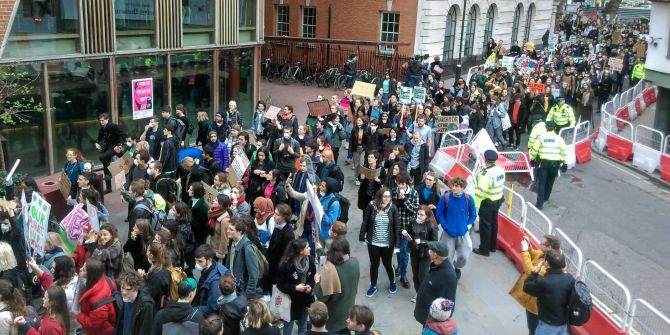Faith communities play an active role in climate discussions. Just as they did in 2015 around the Paris Accords, people of faith have mobilised to impact the upcoming COP26 gathering in Glasgow. As Beatrice Liese outlines in this post, faith communities influence climate discussions through public statements, global advocacy campaigns, building civil society coalitions, and ensuring that deliberations are people-oriented.
Coinciding with COP26 taking place in Glasgow, the LSE Religion and Global Society blog is pleased to host a new series on the environment and religion, showcasing how faith communities respond to and influence the discourse around climate change. This series will feature voices from specialists, diplomats, and activists on the topic.

Many will remember the year 2015 as a key point in the development of a faith voice on climate change. The year that the Paris Agreement was adopted also saw public statements on climate change from every major faith community, including the Pope’s encyclical Laudato Si’, the Islamic Declaration on Climate Change, a Buddhist Declaration on Climate Change, the Lambeth Declaration, the Hindu Declaration on Climate Change, and a Rabinic Declaration on the Climate Crisis. A coherent faith voice could also be found in the highly political climate negotiations themselves, where the engagement of faith-based groups stretches back several decades and has continued over the past 5 years as negotiators work towards determining the final elements of the regime’s rulebook and its implementation.
The international climate change negotiations – that take place under the United Nations Framework Convention on Climate Change (UNFCCC) – cover the establishment and implementation of the international law on climate change. These negotiations are highly technical and ongoing, informed by the scientific assessments of climate change collected by the Intergovernmental Panel on Climate Change (IPCC). Bringing together negotiators from 197 Parties (196 countries and the EU), they are also based on the rationale of international cooperation in good faith. The annual Conference of the Parties (COP) is the most high-profile event in the negotiations calendar but work under the regime continues year-round.
Faith groups have been increasingly active in this context over the years: through global campaigns mobilising the public on climate action led by civil society and interfaith networks, advocacy and engagement ‘on the ground’ within the country where the COPs are hosted, as members of the Interfaith Liaison Committee (a coalition of faith-based NGOs and civil society organisations to the negotiations established in 2013) and through formal avenues as accredited observers to the negotiations. Faith-based organisations have hereby established themselves as a distinct and important group within the civil society presence at the negotiations, which has also been recognised in communications from the UNFCCC Secretariat.
The most visible aspect of faith groups’ engagement in the negotiations is through advocacy. The statements released by authorities from different religious traditions in the lead up to the Paris negotiations offer a case in point. For example, a 2015 group statement, signed by 154 religious leaders and delivered to the UNFCCC Secretariat, called for ambitious action on climate change and outlined key objective ahead of the negotiations. These forms of engagement have served to highlight the moral and ethical dimensions – such as accountability, intergenerational justice and equity – that sit alongside the technical dimensions of the climate negotiations. They have also been significant in establishing faith groups’ role as non-State actors in the implementation of climate actions. Representing large transnational bodies of people, faith-based organisations are in this sense relatively distinct from most other civil society observers.
Within the negotiations, a smaller number of faith-based observers have individually continued their advocacy through oral and written statements and as part of larger civil society coalitions. In this context, advocacy has broadly been led by a commitment to climate justice and protecting the most poor and vulnerable as expressed in different religious traditions. These objectives led faith-based observers to join the large mobilisation of civil society voices campaigning for the inclusion of human rights in the Paris Agreement’s preamble. Today, faith-based observers continue to join other civil society voices in raising awareness of the human rights impacts of climate change and corresponding policies, the need for public participation and equity concerns. Importantly, however, faith-based observers’ advocacy is rooted in religious values and delivered through language that introduces the sacred into a secular political space.
There is also a further – much less visible – aspect to faith-based organisations’ engagement in the negotiations, which is their contribution to the process. Faith-based organisations model a people-oriented approach to the negotiations. This may take the form of bringing the voices of local congregations to the negotiation space or advocating for enhanced public participation. For some faith-based organisations it has meant playing an important role in trust-building between the Parties involved in the negotiations. For others it has meant a focus on practically supporting the wellbeing of those involved in the negotiations or taking the floor in formal plenary to thank negotiators and the 450 staff who make up the Secretariat for their work. This engagement goes beyond the politics of the negotiations and brings the humanity of this undertaking to the forefront.
And yet, in a distinct way this approach is political. In my role at the Quaker United Nations Office, my programme focused on the human impacts of climate change, looking distinctly at the peace and justice concerns related to climate change. Climate change is already affecting the lives of millions of people – through environmental disasters such as wildfires and flooding, forced migration, exacerbating poverty and inequality, and infringements on human rights – and we need strong and ambitious climate action to mitigate and adapt. My work has also often led me to ask the question of what it means to be human in a time of climate crisis? For me, working for a faith-based organisation on the climate negotiations has meant a continuous return to the personal: paying heed to the individuals from different contexts that make up these negotiations and placing value on the relationships that sit at the heart of this work. A people-oriented approach that builds dialogue and understanding is as relevant at the international level of the climate negotiations as it is at the local and national level. This approach places care and justice alongside each other – two tenants that are surely crucial for climate action going forward.
Note: This piece gives the views of the author, and not the position of the LSE Religion and Global Society blog, nor of the London School of Economics.




